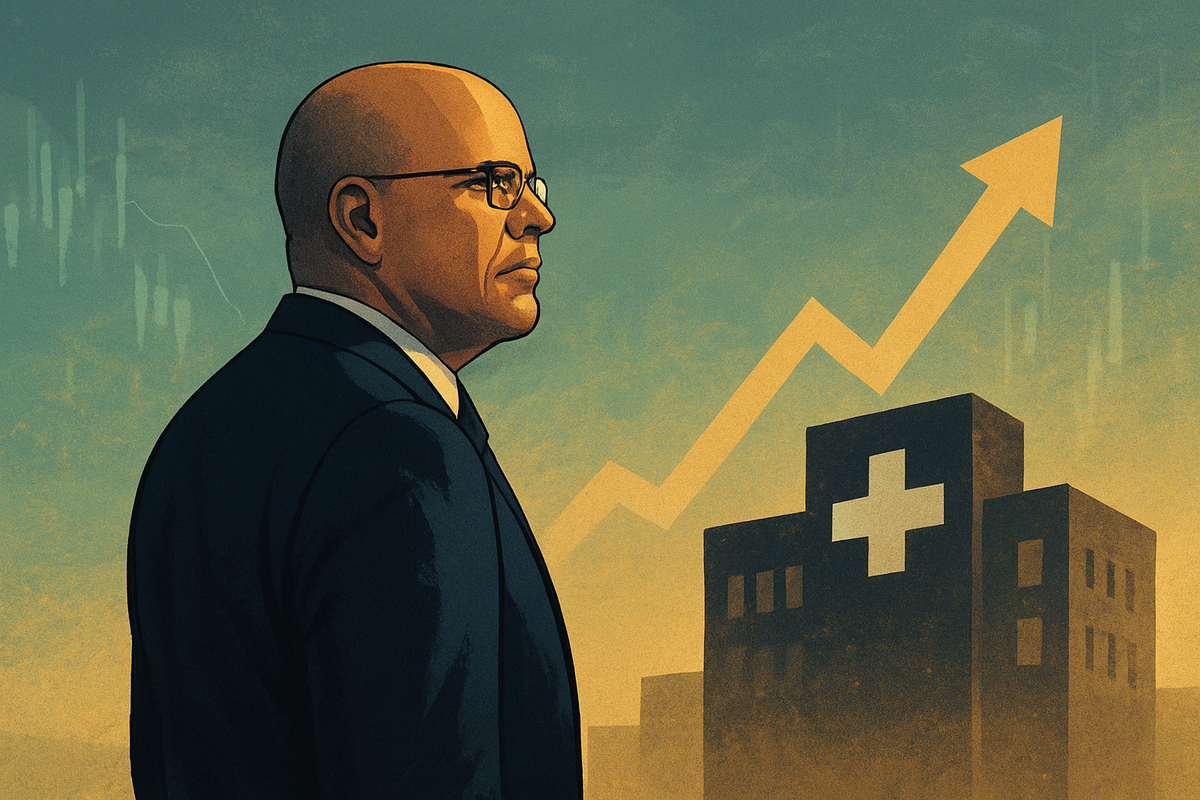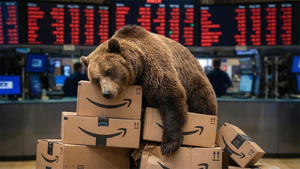
In a move that has captured the attention of the financial world, legendary investor David Tepper, through his firm Appaloosa Management, made a significant contrarian bet on healthcare giant UnitedHealth Group Inc. (NYSE: UNH) during the second quarter of 2025. Far from indicating a negative portfolio impact, Tepper's aggressive increase in his UNH holdings appears to be yielding substantial positive returns as of November 13, 2025, transforming what many saw as a risky play into a testament to his value-oriented investment philosophy. This strategic adjustment came at a time when UNH's stock was experiencing considerable headwinds, making Tepper's conviction a key market signal for the broader healthcare sector.
The decision by Appaloosa Management to dramatically boost its stake in UnitedHealth Group from approximately 180,000 shares in Q1 2025 to a staggering 2.45 million shares in Q2 2025, representing a 1,300% increase, positioned UNH as the second-largest holding in Appaloosa's portfolio, valued at roughly $764 million. This bold investment occurred when UnitedHealth Group's stock had plummeted by about 40% year-to-date in 2025, from above $600 to the mid-$200s, making it one of the worst performers in major indices. Tepper's move, therefore, signaled a deep belief in the long-term fundamentals of the company despite prevailing negative sentiment and significant market pressure.
A Deep Dive into Tepper's Strategic Maneuver and UNH's Rebound
The backdrop to Tepper's substantial investment was a challenging period for UnitedHealth Group. The company faced a confluence of adverse factors that sent its stock spiraling. In the first quarter of 2025, UNH issued a downward revision to its full-year revenue guidance, which was subsequently followed by a complete suspension of its annual forecast. This financial uncertainty was compounded by an abrupt change in leadership, with a new CEO taking the helm. Furthermore, UnitedHealth Group found itself under intense regulatory scrutiny, facing a Department of Justice investigation into alleged Medicare billing practices, encompassing both civil and criminal probes. Concerns over rising medical costs across the industry also contributed to the downward pressure on UNH shares.
Despite these significant headwinds, Tepper's Appaloosa Management, alongside other prominent investors such as Warren Buffett and Michael Burry, viewed the selloff as "overdone." Their collective actions suggest a belief that the market was overly punishing UNH for what they perceived as temporary difficulties rather than fundamental flaws. Tepper's move was a classic contrarian play, identifying value in a high-quality company that was out of favor. This strategy aligns with his well-known approach of investing in distressed assets with strong underlying fundamentals, anticipating a rebound once the market corrects its irrational fears.
The immediate market reaction to these disclosures, particularly following UNH's Q3 2025 earnings report released in late October 2025, has been overwhelmingly positive. Far from a negative impact, Tepper's bet is indeed "paying off." By September 9, 2025, UNH stock had already climbed 11.5% since June 30. The Q3 earnings report further solidified this positive trend, with the company's earnings per share (EPS) topping Wall Street estimates and management upgrading its full-year 2025 outlook. This strong performance, coupled with the endorsement from influential investors, has led to a significant rally in UnitedHealth Group's shares, demonstrating the market's renewed confidence in the company.
Winners and Losers: Implications for Companies and the Market
The most direct beneficiary of David Tepper's contrarian investment is undoubtedly UnitedHealth Group Inc. (NYSE: UNH) itself. The substantial stake taken by Appaloosa Management, coupled with similar investments from other "smart money" players like Berkshire Hathaway (NYSE: BRK.A) (NYSE: BRK.B) and Scion Asset Management, serves as a powerful validation of UNH's intrinsic value and its robust business model. This endorsement from high-profile investors has been instrumental in stabilizing the stock during a tumultuous period and has contributed significantly to its subsequent rebound. The improved Q3 2025 financial guidance further reinforces the company's operational strength, suggesting that the earlier challenges were indeed manageable.
For other companies within the healthcare sector, particularly large-cap managed care organizations and healthcare providers, UNH's recovery could signal a broader stabilization. While UNH faced company-specific issues, the sector as a whole had been under some pressure due to regulatory uncertainties and concerns over rising medical costs. The successful navigation of these challenges by a market leader like UNH, and its subsequent validation by prominent investors, could instill greater confidence across the industry. This might lead to a more positive sentiment for peers such as Elevance Health Inc. (NYSE: ELV) and CVS Health Corporation (NYSE: CVS), indicating that the perceived headwinds might be less severe or more effectively managed than previously anticipated.
Conversely, short-sellers or investors who bet against UnitedHealth Group during its downturn are likely to have experienced significant losses as the stock rebounded. The rapid appreciation of UNH shares following Tepper's investment and the positive earnings report would have squeezed these positions. Furthermore, any investment funds that divested from UNH during its Q2 2025 slump, fearing further declines, may now be regretting those decisions, having missed out on the subsequent rally. This event serves as a stark reminder of the risks associated with betting against fundamentally strong companies, even when they face temporary difficulties.
Wider Significance and Broader Market Implications
David Tepper's successful contrarian play on UnitedHealth Group highlights several broader industry trends and market dynamics. Firstly, it underscores the enduring power of fundamental analysis and value investing, even in volatile markets. In an era often dominated by algorithmic trading and short-term speculation, Tepper's methodical approach to identifying undervalued assets with strong long-term prospects serves as a powerful reminder of traditional investment principles. This event could encourage other fund managers to look beyond immediate headlines and delve deeper into the intrinsic value of companies facing temporary setbacks.
The ripple effects extend to investor sentiment within the healthcare sector. Earlier in 2025, the sector faced a cloud of uncertainty due to regulatory investigations and rising cost concerns. The rebound of UnitedHealth Group, a bellwether in the managed care space, could significantly alleviate some of these anxieties. It suggests that while challenges exist, the underlying business models of major healthcare players remain robust and capable of weathering storms. This could lead to a broader re-evaluation of healthcare stocks, potentially attracting renewed investment interest and stabilizing valuations across the industry.
From a regulatory perspective, while UNH's specific legal challenges are ongoing, the market's positive reaction to the company's operational performance post-Tepper's investment might subtly influence the discourse. It reinforces the idea that even under scrutiny, well-managed companies can continue to deliver value. Historically, similar situations where a company faces regulatory headwinds but demonstrates strong financial resilience have often seen investor confidence return once clarity emerges or operational improvements are made. This event draws parallels to instances where strong companies have navigated temporary crises, eventually emerging stronger.
What Comes Next: Navigating the Future Landscape
In the short term, investors will be closely watching UnitedHealth Group's continued operational performance and any further updates regarding its regulatory investigations. The company's ability to maintain its positive momentum, especially in light of the upgraded full-year 2025 outlook, will be crucial. Any further positive news on the regulatory front or continued strong earnings reports could fuel additional upward movement in the stock. Conversely, unexpected setbacks or adverse developments in the investigations could introduce renewed volatility.
Longer term, UnitedHealth Group may need to consider strategic pivots or adaptations to address the underlying issues that led to its Q2 2025 decline. This could involve enhanced compliance protocols, adjustments to billing practices, or even strategic divestitures or acquisitions to streamline operations and focus on core profitable segments. The company's leadership will be under pressure to demonstrate sustained growth and profitability while navigating the evolving healthcare landscape, including potential policy changes under different administrations.
For the broader market, this event highlights emerging opportunities in contrarian investing, particularly within sectors that experience temporary downturns due to non-fundamental issues. It challenges investors to look for value where others see only risk. Challenges may also emerge if the broader healthcare cost inflation continues unabated, potentially putting pressure on all managed care providers, including UNH. However, the current scenario suggests a market that is willing to reward companies with strong fundamentals and clear pathways to recovery, especially when championed by influential investors.
Potential scenarios range from a continued steady recovery for UNH, solidifying its position as a resilient healthcare leader, to a more volatile path if regulatory pressures intensify or new industry-wide challenges emerge. The successful outcome of Tepper's bet provides a template for how astute investors can capitalize on market dislocations, but it also underscores the importance of deep due diligence and a long-term perspective.
Comprehensive Wrap-Up: Key Takeaways and Future Outlook
The saga of David Tepper's investment in UnitedHealth Group Inc. (NYSE: UNH) offers several key takeaways for market participants. Firstly, it serves as a powerful illustration that market downturns, even for fundamentally strong companies, can present significant buying opportunities for discerning investors. Tepper's aggressive accumulation of UNH shares during its slump, when many others were selling, showcases the efficacy of a contrarian investment strategy when applied judiciously.
Secondly, the event underscores the importance of institutional investor conviction. The collective endorsement of UNH by Tepper, Buffett, and Burry provided a crucial psychological boost to the stock, helping to restore investor confidence and validate the company's long-term prospects. This "smart money" influence can often act as a catalyst for a stock's recovery, especially after a period of intense negative sentiment.
Moving forward, investors should closely monitor UnitedHealth Group's ongoing efforts to address regulatory concerns and manage healthcare costs. While the Q3 2025 earnings report and updated guidance are positive signs, sustained operational excellence and a clear resolution to its legal challenges will be critical for long-term growth. The broader healthcare market will also be a key area to watch, as any shifts in policy, technological advancements, or changes in consumer behavior could impact the entire sector.
In conclusion, David Tepper's investment adjustments in UnitedHealth Group, initially perceived by some as potentially negative, have proven to be a shrewd contrarian play that has significantly benefited his portfolio and provided a strong signal of confidence in UNH's resilience. The event highlights the enduring power of value investing and the potential for substantial returns when investors are willing to take a long-term view and bet against the prevailing market sentiment. The lasting impact of this event will likely be a renewed appreciation for fundamental analysis and a cautionary tale for those who panic-sell during temporary market dislocations. Investors should continue to watch UNH's operational progress and the evolving healthcare landscape in the coming months for further indications of its trajectory.
This content is intended for informational purposes only and is not financial advice






